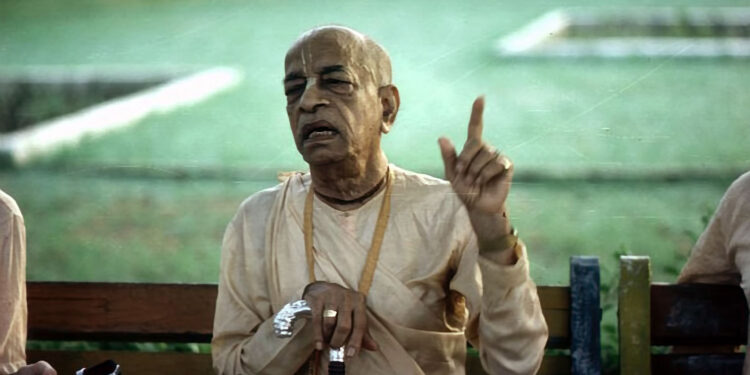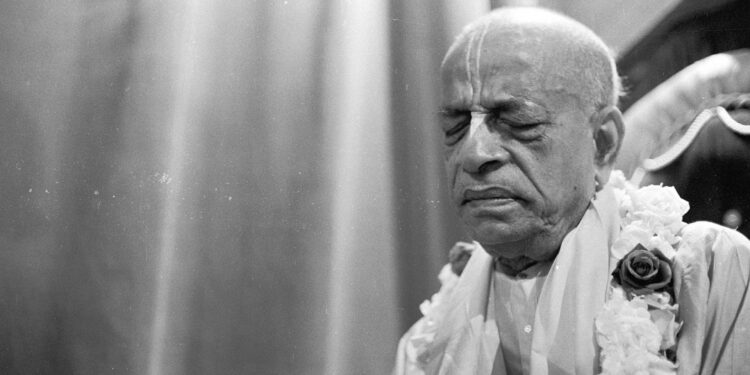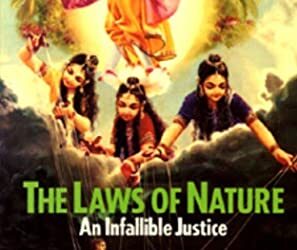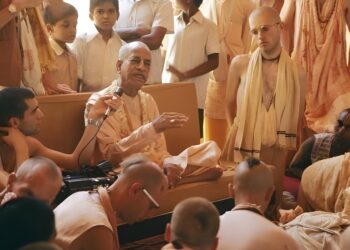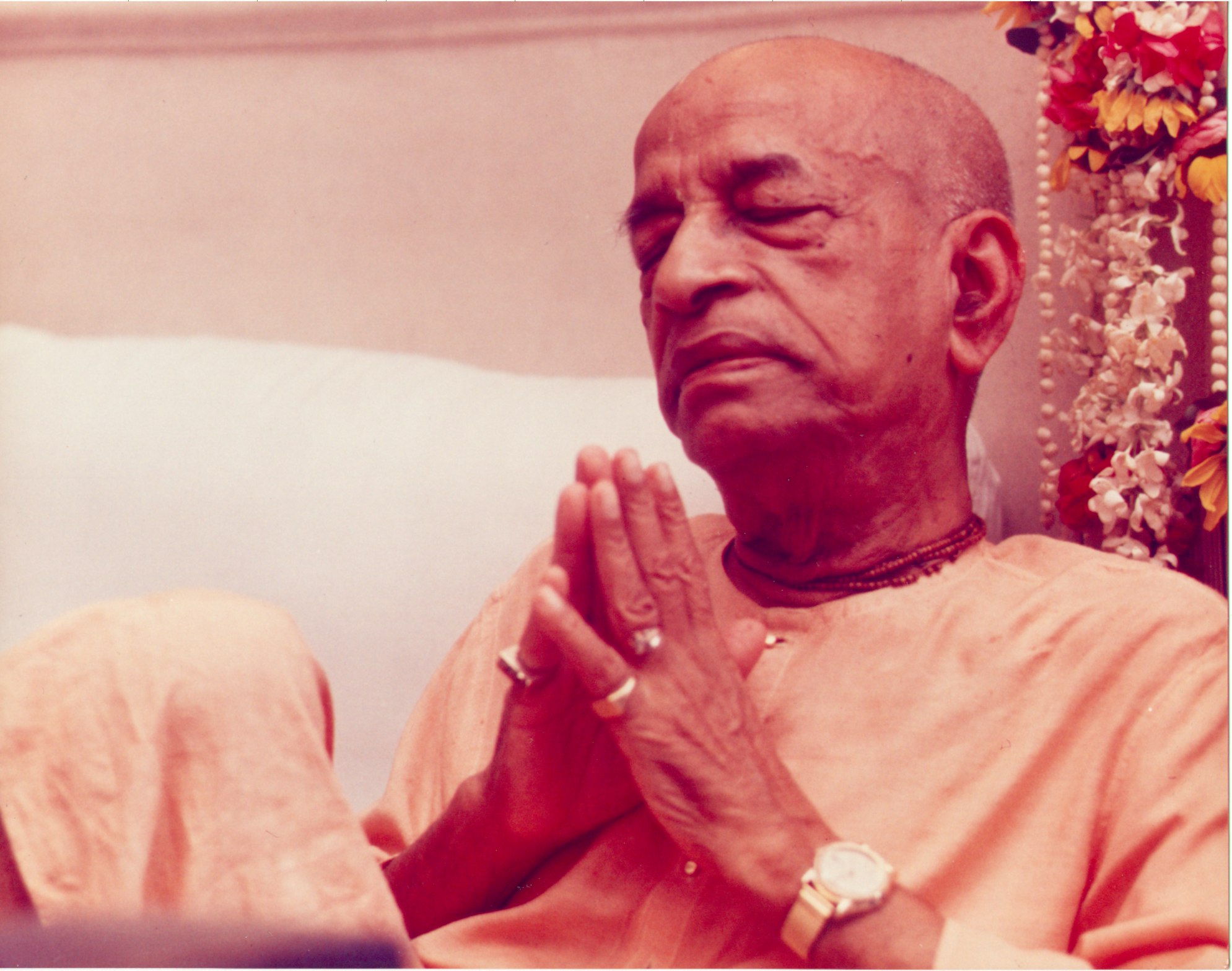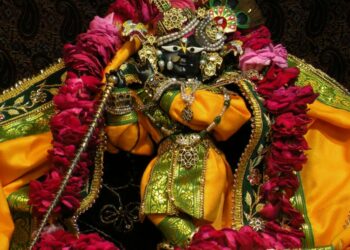By developing genuine devotional qualities, one’s understand of God becomes clear and perfect arjuna uvacasenayor ubhayor madhyeratham sthapaya me ‘cyutayavad etan nirikse ‘hamyoddhu-kaman avasthitankair maya saha yoddhavyamasmin rana-samudyame
“Arjuna said: O infallible one, please draw my chariot between the two armies so that I may see who is present here, who is desirous of fighting, and with whom I must contend in this great battle attempt.”
The next point is that Arjuna wanted to see with whom he had to fight. He had no desire to fight. That will be explained. He was fighting unwillingly. Unwillingly. Because he is a Vaiṣṇava, unnecessarily he does not want to kill, although he is kṣatriya. It is his duty. Whenever there is discrepancy, killing, as representative of Kṛṣṇa… Kṛṣṇa has got two business. Paritrāṇāya sādhūnāṁ vināśāya ca duṣkṛtam [Bg. 4.8]. He has got two businesses. One business is to give protection to the devotees, sādhu, sādhu. Sādhu means devotee. Sādhu does not mean simply by changing dress, saffron color, and smoking beedies. That is not sādhu. Sādhu means devotee.
One who is devotee… That is explained in many śāstras. Sadhavaḥ sādhu-bhūṣaṇām. Sādhu-bhūṣaṇām.
titikṣavaḥ kāruṇikāḥ
suhṛdaḥ sarva-bhūtānām
ajāta-śatravaḥ śāntāḥ
sādhavaḥ sādhu-bhūṣaṇāḥ
[SB 3.25.21]
This is the qualification of sādhu. Sādhu is titikṣava, tolerates all kinds of miserable conditions. He is sādhu. Because this is a place of miserable condition. A sādhu learns how to tolerate. Sādhu is never disturbed. Yasmin sthito guruṇāpi duḥkhena na vicālyate [Bg. 6.20-23]. A sādhu, who has got the shelter of Kṛṣṇa, if he is placed in the severest type of dangerous condition, he is never disturbed. Just like Prahlāda Mahārāja, his father was putting him in so many dangerous conditions, even he was supplying with poison. He knew that “My father has given me poison to drink. All right, let me drink. If Kṛṣṇa likes, He will save me. I am now put into such dangerous position. I have to drink. Father is giving poison. Who can check?” And such a big powerful Hiraṇyakaśipu. The mother cried, requested… He forced the mother, Prahlāda’s mother, “Give your son this poison.” So she begged so much, but he was a rascal demon. “No, you must give.” So the mother knew, the son knew that the rascal father is giving this poison. What can he do, a small child? “All right, let me drink.” Guruṇāpi duḥkhena na vicālyate. He is not agitating. “All right, if Kṛṣṇa likes, I will live.” This is the position of sādhu. He is not disturbed. Titikṣavaḥ. In all circumstances, he is tolerant. That is sādhu. Sādhu does not become disturbed. Titikṣavaḥ. At the same time, kāruṇikāḥ. He is himself disturbed, but he is merciful to others.
Just like Jesus Christ. He is being crucified, and still he is merciful: “God, these people do not know what they are doing. Please excuse them.” This is sādhu. He is personally being disturbed by the demons, but still, he is merciful to the general people. They are suffering for want of Kṛṣṇa consciousness. So even up to the point of death, he is trying to preach Kṛṣṇa consciousness. “Let the people be benefited. Eh, what is this material body? Even if I am killed, I am not killed. This body is killed, that’s all.” This is sādhu. Titikṣavaḥ kāruṇikāḥ. In one side he is tolerant, and other side, merciful.
In the material world, when one man is disturbed, he cannot do any beneficial work to any others. He is disturbed. “No, I am very much disturbed. Don’t talk with me.” No. But sādhu still goes on benefiting the people in general. Titikṣavaḥ kāruṇikāḥ [SB 3.25.21]. And what kind of benefit? The so-called rascals humanitarian work? No. Suhṛdaṁ sarva-bhūtānām [Bg. 5.29]. He is beneficial to all kinds of living entities.
Not this rascaldom, daridra-nārāyaṇa. Just like one rascal has manufactured this daridra-nārāyaṇa. The poor man has become Nārāyaṇa, and the goat Nārāyaṇa is killed for their feeding. Not this kind of sādhu. Suhṛdaṁ sarva-bhūtānām. A sādhu will not allow any kind of killing. See in the Christian religion, it is first injunction is “Thou shalt not kill.” If you want to become religious… They are simply killing, and still, they are claiming “Christian.” What kind of Christian? Simply their business is killing. So it is very difficult to find out a Christian, although they are claiming, I am “Christian.” It is very difficult. Because their business is killing. And Lord Jesus Christ ordered, first order is, “Thou shalt not kill. Thou shalt not covet.” Who is following?
So sādhu is suhṛdaṁ sarva-bhūtānām. Why he should allow animal killing? They are also living entities, but for their benefit, the so-called sādhu says, “The animal has no soul.” What is this nonsense? Animal has no soul? Why? What is the difference between animal and man? What are the symptoms of possessing the soul? They are all equal. The man also eats, the animal also eats. The man also sleeps, the animal also sleeps, the man also have sex life, the animals also have sex life. The man also defends, the animals also defends. So where is the deficiency that you say that the animal has no soul?
Imperfect knowledge. Or making adjustment for their own benefit. Now they are making correction: “Thou shalt not kill,” “Thou shalt not murder.” That means it will come to human being. But the actual commandment is “Thou shalt not kill.” But these Christian people, they are making some amendment, “Thou shalt not murder.” Because murder will apply to the killing of human beings. But Lord Jesus Christ never said like that. “Thou shalt not kill.” It is applicable both for human being and for animal or even for trees. Unnecessarily you cannot kill. That is sādhu. Suhṛdaṁ sarva-bhūtānām [Bg. 5.29]. “Don’t kill my brother, but you can kill my neighbors.” Not like that. He is not sādhu. Sādhu is kind to all living entities.
Kṛṣṇa consciousness means to become kind to everyone. Therefore we say, “No meat-eating.” Meat-eating means killing the animals. Killing the animals. Why you shall kill animals? You have to take Kṛṣṇa prasādam. Patraṁ puṣpaṁ phalaṁ toyaṁ yo me bhaktyā prayacchati, tad aham aṣnāmi [Bg. 9.26]. Kṛṣṇa says… Kṛṣṇa is God. He can eat everything, everything. Kṛṣṇa ate fire, you know. There was forest fire in Vṛndāvana. All the cowherds boys they became very much frightened, “Kṛṣṇa.” “Yes, I’m ready.” He ate up all the fire. So for Kṛṣṇa He could eat anything He likes. He is God. But still, He recommends, patraṁ puṣpaṁ phalaṁ toyaṁ yo me bhaktyā prayacchati. Why? Because we have to take Kṛṣṇa’s prasādam, so therefore He is recommending, “These things you can give Me.” Patraṁ puṣpaṁ phalaṁ toyaṁ. So that is our food. We are devotees of Kṛṣṇa. We are meant for eating the remnants of foodstuff offered to Kṛṣṇa.
That is our… Jihvā, tāra madhye… If you want to conquer the tongue, then you fix up your mind that you shall not take anything which is not offered to Kṛṣṇa. Then your tongue will be controlled. Tāra madhye jihvā ati lobhamaya sudurmati. Tongue is the bitterest enemy of the living being. The tongue is dragging. Jihvā. “Kindly give me this immediately. Kindly give me this wine immediately. Kindly give me this tea immediately. Kindly give me this cigarette immediately. Kindly give me this meat.” Why? Control. Kṛṣṇa says, patraṁ puṣpaṁ phalaṁ toyaṁ [Bg. 9.26]. So we have to take prasādam, eat Kṛṣṇa prasādam. Then naturally the other things will be negativated. This is the position. Suhṛdaṁ sarva-bhūtānām [Bg. 5.29].
So if all human beings become vegetarian, not vegetarian, but eater of the Kṛṣṇa’s prasādam, all these liquor house and slaughterhouse and brothels will be closed. This is Kṛṣṇa consciousness movement. We want to close these nonsense places of sinful life: brothels, illegitimate sense gratification, sex relationship, prostitution. If we are embarrassed with this sinful life, there is no possibility of becoming again acyuta. We remain cyuta, fallen. We remain fallen.
It is not so easy thing that “I do everything, whatever I like.” Some rascals preach that “Oh, religion has nothing to do with your eating. You can eat anything you like, and still you become a religious man.” This is all nonsense. Nobody can become religious man if he is attracted by sinful activities. It is not possible. You must stop sinful activities. That is first condition. Otherwise you cannot understand what there… People… Perhaps, in this Kṛṣṇa conscious, except this Kṛṣṇa conscious movement, all rascals, they do not know what is God. They have no clear conception of God. Because they are sinful. We can give the name, address and everything of God, clear conception, not vague idea, “God may be like this, God may be like that.” Why maybe? He is God.
veṇuṁ kvaṇantam aravinda-dalāyatākṣaṁ
barhāvataṁsam asitāmbuda-sundarāṅgam
kandarpa-koṭi-kamanīya-viśeṣa-śobhaṁ
govindam ādi-puruṣaṁ tam ahaṁ bhajāmi
[Bs. 5.30]
Clear conception. The śāstra, Brahma-saṁhitā, clear description of God, veṇuṁ kvaṇantam. He is playing on flute. It is not that the Muralīdhara, Śyāmasundara, Kṛṣṇa, has been imagined by some poet. No, it is described in the śāstra, the form of the Lord. He is busy in playing flute, veṇuṁ kvaṇantam. Aravinda dalāyatākṣaṁ [Bs. 5.30], His eyes are just like petals of the lotus flower. Veṇuṁ kvaṇantam aravinda, barhāvataṁsa, there is a peacock feather on His head. Kandarpa-koṭi-kamanīya-viśeṣa-śobhaṁ, and He is so beautiful that His beauty can cut down thousands of Cupids. Cupid is supposed to be the most beautiful in this material world. Kandarpa-koti-kamanīya-viśeṣa-śobhaṁ govindam ādi-puruṣaṁ tam ahaṁ bhajāmi [Bs. 5.30]. Clear conception.
This is the description of God in the śāstra. And when God came, Kṛṣṇa came on this planet, the same description. He is playing on flute, He has got the feather, peacock feather. So this painting of Kṛṣṇa is not an artist’s imagination. It is exactly the form. So here is the form of the Lord. Here is the name of the Lord. Here is the activities of the Lord. This is clear conception. A sādhu knows what is God. Or sādhu cannot know. They are thinking, “God must be like this, God may be like this, He must be a very old man,” because adi-puruṣa. He is the first living… In this way… So you cannot create God by imagination. That is not possible. God is God, always. You have to know simply what is God. He is never cyuta.
God never becomes fallen down from His original position. The original position is, God describes Himself, mattaḥ parataraṁ nānyat: [Bg. 7.7] “There is no more superior authority than Me.” That is God. One, if he is controlled, how he can be God? The supreme controller is God, the supreme controller is Kṛṣṇa. Īśvaraḥ paramaḥ kṛṣṇaḥ [Bs. 5.1]. Īśvaraḥ means controller, and paramaḥ means supreme. And who is that? Kṛṣṇa. Kṛṣṇa says also, mattaḥ parataraṁ nānyat kiñcid asti dhanañjaya [Bg. 7.7]. So He is acyuta. He keeps His position. He never falls down. We are all fallen souls. Because our position, our Acyuta position is to serve Kṛṣṇa. Because we are part and parcel of Kṛṣṇa.
The same example: Just like this finger is part and parcel of my body. Its business is to serve the body. That is the business. There is no other business. A finger can pick up a rasagullā and keep it here. The finger cannot eat. Similarly, we cannot eat directly. That is our diseased condition. We have to offer Kṛṣṇa. When Kṛṣṇa eats, if we eat that, then we become energized. Just like you rasagullā put into the mouth. When it goes to the stomach, the finger immediately becomes reddish. The finger enjoys. Not only the finger, the eyes enjoy, the legs enjoy, because the energy is distributed. Directly we cannot be energized by eating. We must eat Kṛṣṇa’s prasādam. This is principle. Jīvera svarūpa haya nitya kṛṣṇa dāsa [Cc. Madhya 20.108-109].
So if we serve Kṛṣṇa, that is our Acyuta position. If we deny to serve Kṛṣṇa, that is vicyuta, fallen condition. Acyuta and vicyuta. So to become Kṛṣṇa conscious means acyuta-gotra. Acyuta-gotra. Gotra, perhaps you do not know. Gotra is the family tradition. According to Vedic civilization, everybody has got gotra. Gotra means of the same family, of ṛṣis, gotra, from the ṛṣis. So we have to become acyuta-gotra, again belonging to the family of Kṛṣṇa. Now we are fallen. Therefore we have forgotten that we belong to the family of Kṛṣṇa. When we revive our consciousness, Kṛṣṇa consciousness, that “I belong to the Kṛṣṇa’s family…” Kṛṣṇa is not alone, eko bahu śyāma. He wants to enjoy.
So we are family members of Kṛṣṇa, not void. That is another rascaldom. Why Kṛṣṇa should be alone? He is so powerful, He is so opulent, have you got any experience that a powerful person, opulent person is alone? Where is that example? Any rich man, any powerful man, any king, any lord, oh, he has got so many associates. So how Kṛṣṇa can be alone? Kṛṣṇa is never alone. Therefore you will find always Kṛṣṇa with the gopīs, Kṛṣṇa with the cowherds boys, Kṛṣṇa with Arjuna. Kṛṣṇa is never alone. So these are the conditions of becoming acyuta. So Arjuna knows all these things because he is a devotee. Therefore particularly he is addressing Kṛṣṇa, senayor ubhayor madhye rathaṁ sthāpaya me acyuta [Bg. 1.21]. That’s all right.
Thank you very much.
Source: Srila Prabhupada Lecture, Bhagavad-gītā 1.21-22, London, July 18, 1973


